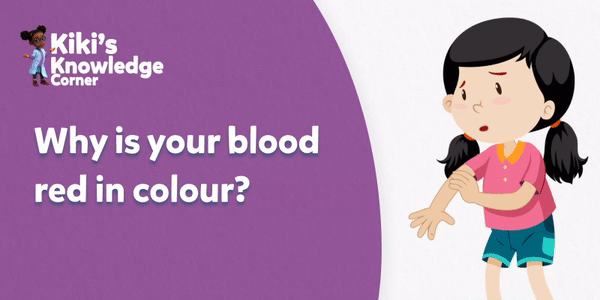
Hello, young learners, It’s me Kiki, and I am back with another episode of Knowledge Corner. I want to thank you for the enthusiasm that you showed for our post on Goosebumps. That made me think: how do we make this episode much more fun and enriching?
Yesterday, I was playing with my friends Jax and Jane, when I had a fall and hurt my knee. It began to bleed. After bandaging my wound, I began wondering – Why is our blood red?
When I began exploring answers, I got really fascinated by the science behind how blood got its colour! I can’t wait to share what I learnt with you. Before we get into it, let us first understand what blood is and what it does.
Blood is a fluid that circulates inside the body in tubes called blood vessels. Around five litres of blood flow inside a human body. It’s red in colour and performs a very important function – transporting oxygen and nutrients to our internal organs, such as the brain, skin, lungs, etc. The components in the blood help you fight diseases. It is one of the most important fluids present inside humans and other animals.
And when you fall or get hurt, these blood vessels on the skin rupture and you begin to bleed. Blood oozes out of the place where you are hurt and once you finish the first aid, the wound closes up and you stop bleeding.

Your blood vessels rupture when you fall down
Human blood contains blood cells – red blood cells, white blood cells, platelets and a fluid called blood plasma. The name ‘red’ blood cells is an easy giveaway. Yes, the blood is red in colour because of these cells. However, why are these cells red?
The red blood cells contain a component called haemoglobin (say hee-mo-glo-bin), which is rich in iron. And when the red blood cells transport oxygen inside them, the iron in the haemoglobin mixes with oxygen. It is a chemical reaction (You will learn more about chemical reactions in science later in school). When this chemical reaction happens, the colour of the blood becomes red!
That’s how blood gets its red colour!

Blood is red because of the red blood cells
Wait, but that’s not all! You must be wondering: what about the white blood cells and platelets? Don’t they lend any colour to blood? Although white blood cells and platelets are present in the blood, the red blood cells are so much more in number. Imagine this: in one drop of blood, there are more than a million red blood cells, while there are only around a few thousand white blood cells and even fewer platelets. For every white blood cell, there are 1000 red blood cells. And that’s why it seems mostly red.
We have mentioned earlier that humans and animals have blood. This brings us to the next question: Do animals have red blood? Do their cells have haemoglobin too? A lot of animals have red blood, because of the presence of haemoglobin. However, some octopuses and spiders have blue blood. They have a component called hemocyanin, which is rich in copper. When the chemical reaction with oxygen happens, the blood becomes blue!
For some lizards, the blood is green because of a component called biliverdin. In short, most animals have red blood, with the exception of a few. Fascinating, isn’t it?! Here are some interesting facts about blood that you may not know about.
I hope you had a good time understanding how our body’s important fluid gets its colour. What more about the human body would you like to learn? Share your answers in the comments.
Liked this blog? Also read
Aparna is a mom, singer and dreamer. At BYJU'S, she writes stories about learning for children. She believes in the power of music, especially ghazal, the magic of the universe and happy learners. When not writing or singing, you will find her intensely engaged in conversations about life and the power of words.
Comments
Ayesha
April 19, 2022
Interesting facts Kiki
Vishal Singla
March 27, 2022
It’s so fascinating to know the facts about our human body. Keep creating these stuff. My daughter really astonished as she is wondering that it is real thing?
Aashish Singh
March 23, 2022
Really amazing
shalvi sinha
March 21, 2022
Very nice
Very effective
shalvi sinha
March 21, 2022
Very nice
Very effictive
Aditya Panda
March 21, 2022
thanks kiki..have a great day
Jashank
March 20, 2022
Very Interesting Facts explained in simple way
Arushi Dey
March 20, 2022
very nice. Thanks
AAbhas
March 19, 2022
Yes,I like to learn things like this
Yash Mondal.
March 19, 2022
I love byju’s.????????❤️❤️❤️❤️
Rahmath Aafiya
March 17, 2022
It is very nice and useful also.
Sunil Kumar Sahu
March 17, 2022
It’s really very much informative and interesting too. Thank you so much. Please keep going.
jonathan
March 16, 2022
very useful information, thank you
Aksharaasree Raviram
March 16, 2022
Usefull information
Laya M
March 16, 2022
I love this concept of why blood is red in color.
I also like to know why do children get more coughs and colds?
Ila Sharma
March 16, 2022
Very nice thanks ma’am
Fatemah Zahra
March 16, 2022
THIS IS A GOOD INFOR6, I WANT TO KNOW ABOUT BL00D SUGRR
Sree Harcitha
March 15, 2022
Very useful information.
Brijeet kundu
March 15, 2022
Very nice
Very effictive
Athirupan.M
March 15, 2022
How muscles are formed
Ila
March 15, 2022
Very nice
J.Jagnavee
March 15, 2022
science class
Atul Amol garad
March 15, 2022
1yar